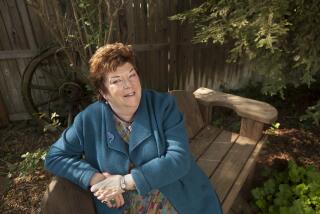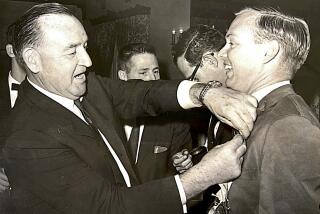PASSINGS: Barbara Rossier; Robert N. Wold; Allan Sekula; Lisa Robin Kelly; Jane Barnett; Henry Polic II
- Share via
Barbara Rossier
Special education expert
Barbara Rossier, a special education expert who became one of the namesakes of USC’s school of education after she and her husband pledged $20 million to it, died Sunday, the university announced. A resident of Villa Park, she was 78 and died of lung cancer.
The couple’s 1998 pledge to what then became formally known as the USC Barbara J. and Roger W. Rossier School of Education was the largest ever made to an American education school at the time. Both of them had earned doctoral degrees at the school in the early 1970s and went on to success in running their own Orange County school for emotionally and developmentally disabled children, along with other counseling and real estate enterprises.
She was born Barbara Dougherty in Wyoming in 1934 and moved with her family around the West, including Alaska and Oregon, as her civil engineer father worked on dams and other projects. She graduated from Brigham Young University and came to Southern California to teach in Bellflower.
Rossier and her future husband Roger met while working as guidance counselors in Westminster public schools and married in 1965. In 1980, they purchased a private school in Garden Grove for children with learning disabilities and emotional problems and built it to an enrollment of nearly 200. They sold it in 1998.
The Rossiers invested in commercial and residential real estate and also were involved in educational publishing and counseling services for students with special needs. Barbara Rossier, who was a clinical and educational psychologist, taught at several universities in Southern California, including USC and UC Irvine.
For about 15 years, she was chairperson of the USC education school’s advisory panel and advocated successfully for the school to revive its programs in special education teacher training.
Robert N. Wold
Satellite technology innovator
Robert N. Wold, 87, an innovator in the use of satellite technology for the distribution of television programming, died Saturday in Irvine of complications from dementia, his family said.
Born in Minneapolis on Sept. 11, 1925, Wold served in the Navy during World War II and graduated from the University of Minnesota in 1950. He started his career in advertising, first at CBS and later with the agencies Campbell Mithun and NW Ayer.
Wold left advertising in 1971 to consult with sports rights holders on distribution to television and radio. At that time, live telecasts were distributed via cable. Wold pushed for using satellites and in 1975 was credited with the first satellite transmission of a live event, a baseball game.
In 1977, Wold Communications orchestrated the real-time satellite delivery of the Richard Nixon–David Frost interviews to 165 television stations around the country.
Wold Communications went on to build and operate satellite ground stations and mobile uplinks that were instrumental in the creation of daily syndicated television shows such as “Entertainment Tonight” that could be beamed to local TV stations around the country.
In 2001, Wold was inducted into the Society of Satellite Professionals International Hall of Fame.
Allan Sekula
CalArts professor
Allan Sekula, 62, a renowned photographer and longtime professor at the California Institute of the Arts whose artistic output centered on the political consequences of maritime commerce and global trade, died Saturday in Los Angeles. He was battling advanced gastro-esophageal cancer, according to CalArts, where he had taught classes in photography and media since 1985.
As a child, Sekula lived in San Pedro, and his proximity to one of the busiest ports in the nation seemed to have greatly affected his work as a photographer. His images often focused on the shipping industry, ocean travel and commerce.
A 1996 solo exhibit at the Santa Monica Museum of Art featured Sekula’s photographs of famous ports around the world as well as images of the ocean. A Times review called the show “a handsome combination of romance and realism, intimacy and detachment.”
In addition to photography, Sekula was a writer and critic whose articles appeared in numerous art-related publications. His 1986 essay “Body and the Archive” explored the notion of photography as a political medium in modern history.
He also published books on photography and other visual media.
One of Sekula’s more recent works was the experimental documentary “The Forgotten Space,” which he co-directed with longtime collaborator Noël Burch. The 2010 movie explored the shipping industries and other forms of international commerce. A review of the movie in the New York Times called it “unabashedly polemical and rigorously pessimistic, a sustained Marxian indictment of 21st-century capital.”
Sekula was born in 1951 in Erie, Pa., and moved as a child with his family to California. He attended UC San Diego and took classes taught by artist John Baldessari.
After leaving school, Sekula taught at New York University and Ohio State University before beginning his tenure at CalArts.
--
Lisa Robin Kelly, an actress on the Fox sitcom “That ‘70s Show” who had struggled with addiction, died in her sleep Wednesday night, said her agent, Craig Wyckoff. Kelly, who had voluntarily checked into a Los Angeles rehabilitation facility on Monday, was 43. The cause of death has not been determined.
Jane Barnett, a longtime conservative activist who served as chairwoman of the Los Angeles County Republican Party from 2009 to 2011, died Aug. 8 after battling cancer, the party announced. The Burbank resident was 65.
Henry Polic II, a character actor who played Uncle Jerry Silver on “Webster” and the Sheriff of Nottingham on Mel Brooks’ 1975 TV series “When Things Were Rotten” and appeared regularly in local theatrical productions, died Sunday in Sherman Oaks, his manager Brad Lemack said. He was 68 and had cancer.
Times staff reports
More to Read
Start your day right
Sign up for Essential California for the L.A. Times biggest news, features and recommendations in your inbox six days a week.
You may occasionally receive promotional content from the Los Angeles Times.






